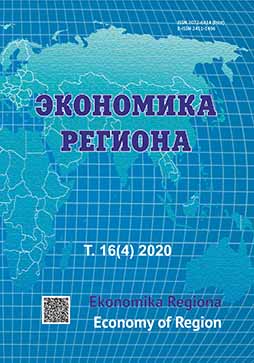Оценка неравенства регионов в формировании доходов федерального бюджета на основе критерия Парето
Assessing Regional Inequality based on Revenues
of the Federal Budget using the Pareto Principle
Author(s): Leyla MokhnatkinaSubject(s): Economy
Published by: Институт экономики Уральского отделения Российской академии наук
Keywords: inter-budgetary reallocation; Pareto principle; budget tax revenues; tax exemptions; inter-budgetary relations; fiscal federalism; regional budget; interregional differentiation; equalising
Summary/Abstract: The use of fiscal instruments for regulating territorial development has both positive and negative macroeconomic effects related to the withdrawal of revenue from more economically developed regions. Therefore, using the Pareto principle, this paper assesses the negative effects of budgetary reallocation. This study considers inter-budgetary reallocation as an annually recurring four-stage process of regional budgets reproduction. The article analyses the first stage of the process, namely, the creation of resource allocation base. A hypothesis has been tested to examine whether the centralisation of tax revenues in the federal budget and, consequently, an increase in inter-budgetary reallocation does not reduce, but exacerbates inequality in regions due to their revenue depletion and limited self-development. The study assessed the contribution of federal districts and individual constituent entities of the Russian Federation to the federal budget, withdrawal of regional revenues, and the concentration of territorial revenues to the federal budget. Based on the ranking of regional contributions to federal revenues, I built a Pareto diagram, checking the 80/20 rule for grouped and non-grouped data. Calculations and comparison of the data for 2017 and 2010 confirm numerous negative effects. For example, there is an increase in the withdrawal of regional revenues and a significant concentration of federal revenues for a limited number of regions. Additionally, negative effects include the existence of a direct relationship between regional revenues and the rate of their withdrawal, as well as the predominance of the equalising component over the stimulating one in regional socio-economic development. These effects lead to revenue depletion in the territories and increased centralisation of budgetary resources, contradicting the principles of fiscal federalism. Authorities can use the research results, conclusions and suggestions for managerial decision-making to improve intergovernmental relations in the Russian Federation.
Journal: Экономика региона
- Issue Year: 16/2020
- Issue No: 4
- Page Range: 1377-1392
- Page Count: 16
- Language: Russian

